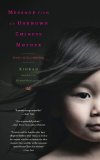Summary | Excerpt | Reviews | Beyond the Book | Readalikes | Genres & Themes | Author Bio

Stories of Loss and Love
by Xue Xinran
In December 2009, after I had finished editing this book, I returned to China and tried once more to confront my mother. I wanted to unburden myself of long-buried memories; I wanted to tell her what had happened to me, her daughter, during the Cultural Revolution. I wanted her to understand the nightmarish torments I went through, and which still haunt me. For her to know how much I missed her and still long for her, my mother. But I could not get a word out. I just sat silently in front of her, in floods of tears.
Over the years I have begun to understand how those adopted daughters long to understand their birth mothers and to tell them how much they love them. I decided that, no matter how painful it was, I would write down the stories I had stored up for so long. This book was to be an honest record of mothers' lives, a gift of mother-daughter love that I, a daughter, could share with other daughters, a message from an unknown Chinese mother to her daughter, wherever she may be.
I started writing this book on February 2, 2008, in a little house by the sea on Blues Point Road, Sydney, Australia. Strangely, my labors were accompanied by a fortnight of the violent storms that a southern hemisphere summer sometimes brings.
February 7, 2008, was the Chinese New Year, or Spring Festival, and the Australian media reported on the tens of thousands of Chinese who joined in the cultural festivities. Among them were more than a hundred families who had adopted Chinese children. As I watched these girls dressed in Chinese costumes asking their Australian parents in English what the Spring Festival was, I had mixed feelings. Were these girls really China's daughters?
Yes, I think they were. As the ancients said: when oranges from the south were transplanted to the north, they were still oranges, even if they tasted a bit different. I believe that even though these girls have been brought up in a foreign land and a foreign culture, the blood of their Chinese mothers still runs in their veins.
But what do their birth mothers feel? Does the unknown Chinese mother feel joy or sorrow at knowing that her beloved daughter is now happy in another mother's arms? I did not actually give birth to a daughter, nor am I the mother of an adopted daughter, but I weep every time I try to imagine how they feel. And once I lost a little girl who was like a daughter to me, so I know something of what they feel. There is an emptiness that can never be filled, there is an ache felt by the broken-hearted birth mother, by the adoptive family in the West, and by the daughter who will spend the rest of her life in a dual embrace - because the life she lives is a product of great joy but also of great sorrow.
By the end of 2010, the number of Chinese orphans adopted worldwide had reached more than 120,000. America has the largest number of adopted Chinese children from China, nearly 80,000.* These children have gone to twenty-seven countries - and almost all were girls. Most Chinese find the adoption figures almost incredible, just as they find it hard to believe that Chinese children have found mothers and homes in so many countries. Why does China have so many orphaned girls?
Most Chinese would say that it is because there is something inherently wrong with traditional culture; in other words, old customs are rooted in ignorance. Westerners, on the other hand, believe that the one-child policy is to blame. I began to gather information for myself when, in 1989, I started presenting Words on the Night Breeze, a program for women started in Henan, and then moved to Jiangsu Radio in Nanjing.† As this job took me all over China doing interviews, I came across women who had been forced to abandon their babies. I feel there are three main reasons why.
First, female babies have been abandoned in farming cultures of the East since ancient times; second, a combination of sexual ignorance, which remains rife, and the economic boom; and last, there is the one-child policy.
Excerpted from Message from an Unknown Chinese Mother by Xue Xinran. Copyright © 2011 by Xue Xinran. Excerpted by permission of Scribner. All rights reserved. No part of this excerpt may be reproduced or reprinted without permission in writing from the publisher.
I have lost all sense of home, having moved about so much. It means to me now only that place where the books are ...
Click Here to find out who said this, as well as discovering other famous literary quotes!
Your guide toexceptional books
BookBrowse seeks out and recommends the best in contemporary fiction and nonfiction—books that not only engage and entertain but also deepen our understanding of ourselves and the world around us.